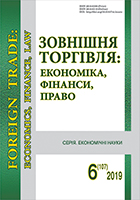National innovation systems: the impact of transnationalization
DOI:
https://doi.org/10.31617/zt.knute.2019(107)02Keywords:
innovation, innovative activity, national innovation system, TNCs, transnationalization, R&DAbstract
Background. The main tendency for the development of national innovation systems is the inability to develop and implement R&D without the use of international technological experience. In this way, international business entities are developing and gradually turning into multi-sectoral international complexes – transnational corporations. TNCs are the core of the modern world economic production system and become key players in the world of research and development, with a significant impact on NIS.
Analysis of recent research and publications has shown that, despite the existence of some scientific achievements, the important scientific and practical problem regarding the impact of transnationalization on national innovation systems remains unresolved.
The aim of the article is to investigate the impact of transnationalization on the development of national innovation systems through transnationalization of the innovative activities of TNCs.
Materials and methods. Methods of comparison, statistical analysis, synthesis, grouping and graphical representation of results were used in the article.
Results. The study contains the impact of transnationalization on national innovation systems by the extensive network of international production of multinational corporations that «destroy» the borders between national markets of goods, capital, labor due to close economic, technological, industrial links between enterprises in different countries of the world, which causes the effect of transnationalization of the economy.
Conclusion. Main feature of national innovation systems development in the world is the reorientation of R&D activities solely on their own to internationalization of innovation activities. The degree of openness to access to knowledge, information, technologies on a global scale is increasing, in particular, the spread of various types of research activities, and the development of national scientific activities, as well as implementation of scientific developments is impossible without the use of international technological experience, foreign developments that are actively generated by TNCs. Competition for the «best» brains is intensifying and international cooperation is being formed within the global innovation system. It transforms multinational companies into key players in the modern world production system, enables them to retain leadership in the world R&D system, which directly affects the development of existing national innovation systems and the formation of new national innovation systems (NIS).
References
Gusakov, N. P., & Kolotyrina, E. A. (2018). Nacional’nye innovacionnye sistemy v uslovijah narastanija neopredelennosti mirovoj jekonomiki [National innovation systems in the face of growing uncertainty in the global economy]. Vestnik RUDN – RUDN University Bulletin. (Vol. 26), 1, 101-115. Seriya: Economica. DOI: https://doi.org/10.22363/2313-2329-2018-26-1-101-115 [in Russian].
Kizim, A. A., Bekirova, S. Z., & Vafaev Z. B. (2009). Upravlenie slijanijami i pogloshhenijami predprijatij v uslovijah globalizacii mirovoj jekonomiki [Management of mergers and acquisitions of enterprises in the context of globalization of the global economy]. Krasnodar: Kubanskij gos. un-t [in Russian].
Lavrov, S. N. (2017). K voprosu o transnacionalizacii rossijskih kompanij neftegazovogo sektora [On the issue of transnationalization of Russian oil and gas companies]. Vestnik mezhdunarodnyh organizacij – Bulletin of international organizations. (Vol. 12), 1, 209-228. DOI: https://doi.org/10.17323/1996-7845-2017-01-209 [in Russian].
World Investment Report (2019). Retrieved from https://unctad.org/en/PublicationsLibrary/wir2019_en.pdf [in English].
Lihachev, V. A. (2016). Mezhdunarodnaja torgovlja ob’ektami intellektual’noj sobstvennosti na sovremennom jetape: jekonomika i regulirovanie [International trade in intellectual property at the present stage: economics and regulation]. Moskva: VAVT [in Russian].
UNCTAD, based on information from Refinitiv Eikon and Orbis (n. d.) [in English].
UNCTAD, based on information from Financial Times Ltd fDi Markets (n. d.) fdimarkets.com. Retrieved from www.fdimarkets.com [in English].
The multinational company is introuble (2017). The Econimist. The UK. Retrieved from https://www.economist.com/news/leaders/21715660-global-firms-aresurprisingly-vulnerable-attack-multinational-company-trouble [in English].
The World’s Largest Public Companies 2019: Global 2000 By The Numbers (2019). Retrieved from https://www.forbes.com/sites/jonathanponciano/2019/05/15/worlds-largest-companies-2019-global-2000/#3ad5564d4ada [in English].
Global Competitiveness Report (n. d.) weforum.org. Retrieved from http://www3.weforum.org/docs/WEF_TheGlobalCompetitivenessReport2019.pdf [in English].
Additional Files
Published
How to Cite
Issue
Section
License
Copyright (c) 2022 Foreign trade: Economics, Finance, Law

This work is licensed under a Creative Commons Attribution 4.0 International License.
This work is licensed under a Creative Commons Attribution 4.0 International (CC BY 4.0)







